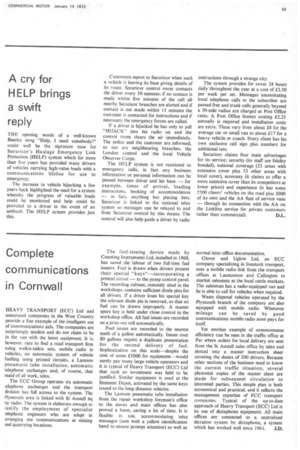Complete communications in Cornwall
Page 45

If you've noticed an error in this article please click here to report it so we can fix it.
HEAVY TRANSPORT (ECC) Ltd and associated companies in the West Country provide a fine example of the intelligent use of communications aids. The companies are surprisingly modest and do not claim to be in the van with the latest equipment. It is, however, rare to find a road transport firm using walkie-talkie sets, mobile radio in vehicles, an automatic system of vehicle fuelling using printed circuits, a Lamson pneumatic tube installation, automatic telephone exchanges and, of course, that maid of all work, telex.
The ECC Group operates six automatic telephone exchanges and the transport division has full access to the system. The Plymouth area is linked with St Austell hq by radio. The system is elaborate enough to justify the employment of specialist :elephone engineers who are adept at manging site communications at mining md quarrying locations. The fuel-issuing device made by Counting Instruments Ltd, installed in 1968, has saved the labour of two full-time fuel issuers. Fuel is drawn when drivers present their special "keys"--incorporating a printed circuit — to the pump control panel. The recording cabinet, remotely sited in the workshops, contains sufficient diode pins for all drivers. If a driver loses his special key the relevant diode pin is removed, so that no fuel can be drawn improperly. A master spare key is held under close control in the workshop office. All fuel issues are recorded on a print-out roll automatically.
Fuel issues are recorded to the nearest tenth of a gallon automatically. Issues OVCT 80 gallons require a duplicate presentation for the second delivery of fuel. Sophistication on this scale—despite the cost of some £5000 for equipment—would surely pay many large vehicle operators and it is typical of Heavy Transport (ECC) Ltd that such an investment was held to be justified. Similar equipment is used at the Bminster Depot, activated by the same keys issued to the long-distance vehicles.
The Lamson pneumatic tube installation from the repair workshop foreman's office to the stores and main offices has also proved a boon, saving a lot of time. It is flexible in use, accommodating telex messages (sent with a yellow identification band to ensure prompt attention) as well as normal inter-office documentation.
Glover and Uglow Ltd, an ECC company specializing in livestock transport, uses a mobile radio link from the transport offices at Launceston and Callington to market salesmen at the local cattle markets. The salesman has a radio-equipped van and he is able to call for vehicles when required.
Waste disposal vehicles operated by the Plymouth branch of the company are also equipped with mobile radio. Whenever mileage can be saved by good communications mobile radio soon pays for itself.
Yet another example of commonsense efficiency can be seen in the traffic office at Par where orders for local delivery are sent from the St Austell sales office by telex and slotted into a master instruction sheet covering the duties of 200 drivers. Because other sections of the business need to know the current traffic situation, several photostat copies of the master sheet are made for subsequent circulation to interested parties. This simple plan is both economical and practical, and it reflects the management expertise of ECC transport companies. Typical of the up-to-date approach of Heavy Transport (ECC) Ltd is its use of dictaphone equipment. All main offices are connected to a centralized dictation system by dictaphone, a system which has worked well since 1961. J.D.
















































































































